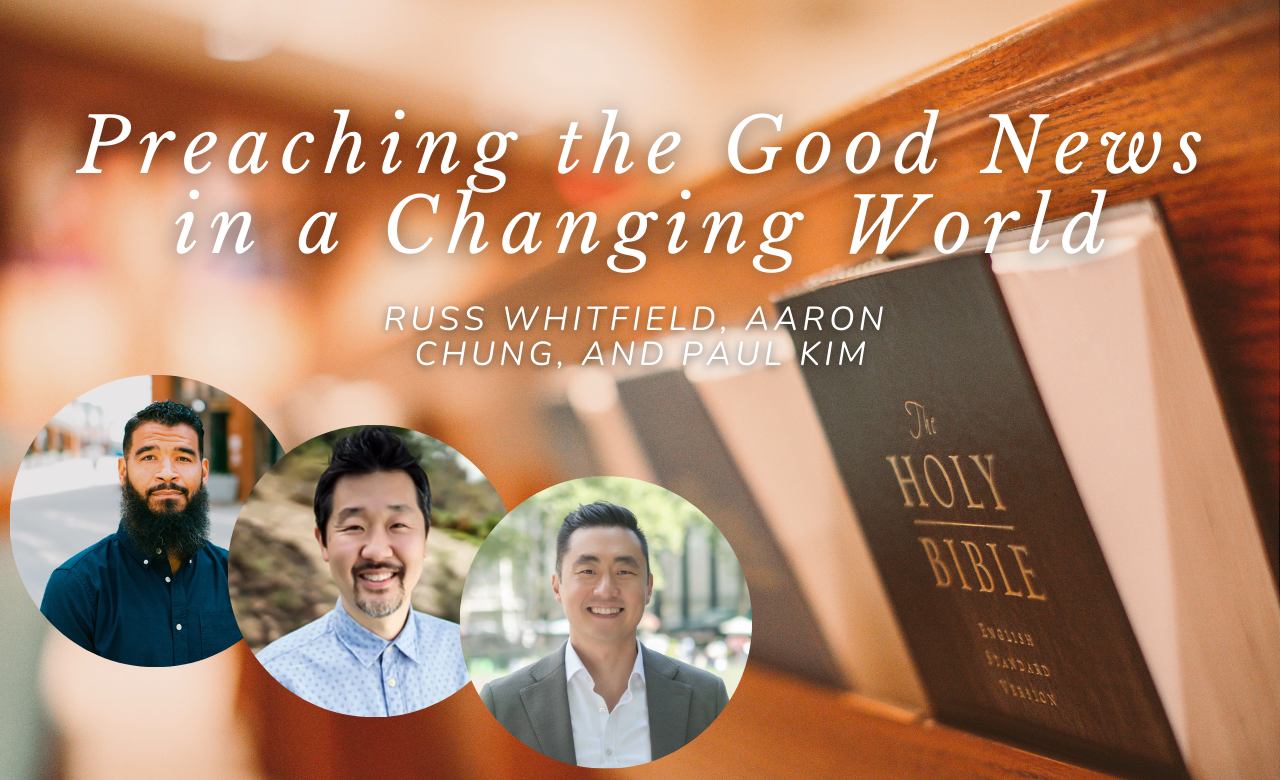Preaching lies at the heart of church ministry. Yet it’s not just about standing in a pulpit—it’s about faithfully proclaiming God’s Word into the real struggles, hopes, and cultural questions of today.
In this conversation, Russ Whitfield (AMR Board Member) sits down with two friends, Aaron Chung (Exilic Church, New York City) and Paul Kim (Redeemer Presbyterian Church, San Diego), to talk about the meaning of preaching, how they prepare sermons, and what encouragement they would give to fellow preachers.
Topics at a Glance
If you’d like a preview of this rich conversation, here are the topics at a glance.
What Is Preaching and Why Does It Matter?
Aaron: “Everything starts in Genesis 1. Our God is a speaking God. His words have power to create light, humans, and order from chaos. Preaching, as foolish as it may seem, is the instrument God uses to create new life and redemption. Words still have power.”
Paul: “When the prophets spoke, they were a mouthpiece for God. That’s what preaching is: God speaking to His people. It’s not about information transfer but about engaging the whole person. The Spirit brings the Word to life.”
Russ: “Preaching the good news into the daily news—that’s the work before us.”
What Makes a Good Sermon?
Paul: “Content, form, and delivery. Content: is it faithful to the text and centered on Jesus? Form: is it clear and understandable? Delivery: is it Spirit-empowered, engaging heart and mind?”
Aaron: “Clarity matters. What do people need to know, why do they need to know it, and what do they need to do? Beyond that, good preaching engages culture. Jesus often said, ‘You have heard it said, but I say to you.’ Preaching must confront and reframe the cultural stories people live by.”
How Do You Prepare a Sermon Each Week?
Paul: “Mondays and Tuesdays I read and meditate. Wednesdays I aim to have a working framework; Thursdays I refine with prayer and commentaries. By Sunday, the message is pressed into my heart so I can preach without notes. About 12–15 hours go into each sermon.”
Aaron: “For me, it’s closer to 20. I’m usually working on multiple sermons at once—constantly consuming, archiving, and meditating. The key is that the Word has to light a fire in my heart before I preach it.”
Preaching to Skeptics and Seekers
Aaron: “Keller used to say you need the Bible in one hand and the New York Times in the other. I try to weave in themes of identity, meaning, hope, and freedom in every sermon, because that’s what people today are wrestling with.”
Paul: “I talk with non-Christians and teenagers to hear their questions. What’s missing in their lives? What pushback would they have? That shapes how I preach the gospel into their real struggles.”
The Challenges of Our Cultural Moment
Paul (San Diego): “Our idol is comfort. Following Jesus requires sacrifice, and that clashes with the desire for ease and a good life.”
Aaron (New York): “Hurry, money, and cynicism are constant challenges. In the city, compassion can wear thin. Slowing down to Sabbath and truly see people with God’s eyes is hard but essential.”
Finding Your Preaching Voice
Aaron: “I’m still finding mine. Early on I imitated Keller or others, but authenticity matters more. People can tell when you’ve been with the Lord. Don’t let the pulpit drive you to the Word; let the Word drive you to the pulpit.”
Paul: “It took me about ten years to stop imitating and find a settledness in my own voice. Less is more. Play the long game. Drink deeply from the Word yourself, not just for sermons.”
Advice to Younger Preachers
Paul: “Remember your identity is not in preaching. Die to approval and performance. Be honest with God about your struggles, and rest in His delight in you.”
Aaron: “Jesus loves the local church. Online preachers might be gifted, but you are the shepherd of your people. No one else knows their wounds like you do. Be faithful to them.”
After the Pulpit: Rest and Renewal
Aaron: “I Sabbath with my hands: workouts, basketball, family time. Laughter and friendship with other pastors keeps me grounded.”
Paul: “I take a holy nap. I avoid feedback right away—my heart is too raw. I need space to rest and reset.”

